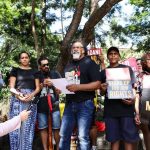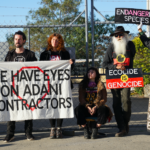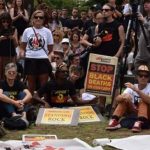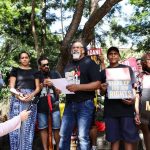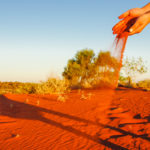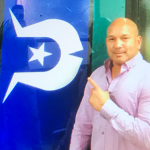“Stand Up and Take Back Your Homelands”: Gurridyula on His Mission to Stop Adani
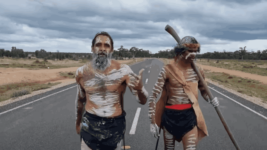
A few months back, a video clip featuring two Aboriginal men marching down the centre of an outback road, as one of them was rapping at the camera, was going viral on social media networks, as the power of the beats and the words on top were a direct strike.
Onamission is the track by the artist Gurridyula: a Wangan and Jagalingou man, who’s been one of the main players in the resistance to the Adani Carmichael coalmine in the Galilee Basin in central Queensland, as its being constructed on his people’s homeland.
Gurridyula, or Coedie McAvoy, has been staging a protest action opposite the entry to the Adani mine site, since the Indian mining giant was able to move in and begin construction on a scaled-down version of its original proposal.
Yet, despite the power of Adani, the man and the company, and the greenlighting of the fossil fuel project at the federal and state level, McAvoy has been able to reclaim vast tracks of land slated for the site using the laws that are sitting on the books in Queensland and the tools of his culture.
The land grab continues
Whilst McAvoy and his father, Adrian Burragubba, were camped on their own land out near the Adani mine site on 29 August 2019, the Palaszczuk government quietly extinguished the Wangan and Jagalingou native title over 1,385 hectares.
But nobody bothered to notify their camp until the following day.
This came after Burragubba had run multiple legal challenges against the mine going ahead, which included questioning the legitimacy of several meetings that were held with traditional owners, so Adani could obtain an Indigenous land use agreement (ILUA) to facilitate the project.
Gautam Adani, head of the Adani group, is one of the richest people on the planet. However, so frustrated by the legal campaign that Burragubba had fought against him, that he took a moment to take the Wangan and Jagalingou elder to court and bankrupt him over defending his own Country.
Indeed, when a 2017 Federal Court decision in relation to a native title claim in southern Western Australia threatened the Adani ILUA, everything was put on hold until the Turnbull government could pass amendments to the Native Title Act 1993 (Cth) to overturn the finding of the court.
The legislation that permitted this move was dubbed the Adani Bill.
Blaktivism
Gurridyula’s new single Dear Anna dropped last week. The song delivers a personal message to Queensland premier Annastacia Palaszczuk about the way in which she cleared the path for Adani, especially around the matter of compulsory acquisition of land.
The rapper, who’s been a musician and performer most of his life, is set to appear in the impressive line-up of artists making up the Blaktivism festival at Melbourne’s Hamer Hall this Thursday night. It will be McAvoy’s first live gig as Gurridyula.
Sydney Criminal Lawyers spoke to Gurridyula about the message he’s conveying via his new tracks, his other current project which involves reclaiming land that Adani is supposed to be able to mine, and how the Human Rights Act 2019 (Qld) is proving to be a very handy instrument.
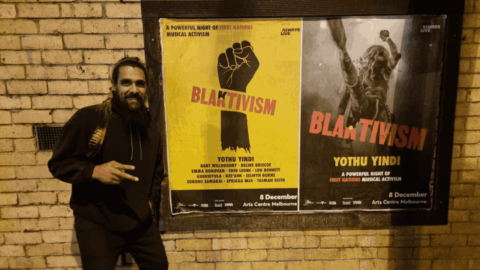
In September this year, it seemed like everyone was talking about Onamission and remarking about the power of the piece. Coedie, how would you sum up the message it sends?
It’s a chronological report on what I’ve been doing. Everything I rap about is fact. I don’t blow anything out of proportion.
The words convey that we have the ability to crush Queensland police powers, because we’ve got a human rights case against them.
They removed us from the camp after we had the police come and try and raid us one morning last year. There were about fifty police officers. They were standing around, so I just started freestyling at the cops.
They removed us a couple of hours after I did that spit. And they made up some bullshit about how we had to have an instrument from Adani to stay there, which wasn’t correct.
We don’t need his permission to be there on pastoral lease. We took the Queensland police to the Human Rights Commission. The commission came back in May 2021 and said we had a case against the police.
So, the Queensland police brought their Crown lawyers to the meeting. The Human Rights Commission said, “You’ve pinched five of their human rights.”
The police couldn’t make a case though, because they don’t know whose land it is. We said go back through the land titles and find out who the original landholder is and when it was bought that off them: my grandmother or my great grandfather.
But they’ve got no evidence of that. So, they said that they can’t prove whose land it is.
We created this position where the Queensland police asked, “What do you want to do?” They didn’t want to take it to court. So, we asked for a notice of regret, an apology.
It was a fake apology. But it wasn’t the apology that I was after. I wanted them to write specific things in there to make public.
And that was that they recognised that Mr Adrian Burragubba, my old man, represents a group of Wangan and Jagalingou people aggrieved by Adani’s occupation of their tribal homelands.
That right there was all I needed. I just went, “Thank you.” And they had no idea what they had done when they sent it to us.
I got online and said, “You don’t know what you have just done. The Queensland police have now recognised the people from there as Wangan and Jagalingou, when the state government tried to stamp us out and take away our native title.”
We were brought back to life by the Queensland police.
With native title, if you lose it, they basically just wipe you off the map. It can be for something as simple as you don’t have a functioning society. Well, that’s because we all got removed and displaced all over the place.
But because there are mines and the possibility of more mines on our Country, they’re not prepared to pay for the compensation. So, they destroyed our native title, and they took away our name.
In 2019, they changed the name of our group from Wangan and Jagalingou to Clermont Belyando, which are not even Aboriginal names.
How did they do that?
They forced it on our people in a meeting. There were people in the meeting who weren’t from there, who said that they didn’t associate with the name. So, they changed the name.
They changed the name of the native title application, which is the name of the tribe. So, they wiped our name off. They told our people that they would not get native title if they didn’t change it.
Is the human rights case finalised?
It got finalised through mediation.
That was the apology?
That was the apology. That came in May of 2021.
And you applied the new Queensland Human Rights Act in doing that?
Yeah. We invoked section 28. It only came out in 2019. We are the first people to use it in Queensland. We created this barrier around us. So, I decided to test the human rights and what the police would do.
I organised an event called Tour de Carmichael. It was a 100 kilometre bike ride down the dirt road off the highway towards Adani’s camp near the footprint, which is 5 kilometres from his mine.
That made everybody sweaty. I got a call from one of the police negotiators. He said, “My boss is asking me to find out if you are going to apply for a permit?”
I said, “Why do I need a permit to apply to ride my pushbike on a public road to my camp, where I have been camping for 4 months? Why do I need a permit?”
“With all the people that are coming with me, think of it like the Forrest Gump effect, I just started running and they all followed me.”
I said to him, “It’s my human right to ride a pushbike on a public road. If any of your rogue officers try to give me or any of my friends an infringement notice for exercising their human right to come and practise a ceremony with me on my traditional Country, then…”
He said, “Oh no-no-no, it’s all good.” And everything went smoothly. The cops came out. They were directing the traffic. We had a convoy of cops in front of us and behind us to help navigate the traffic. And they slept in areas kilometres away, and then came back in the mornings.
So, you’re saying the human rights case enabled you to do that?
Basically. It’s like a sword now. And I’m just wielding and swinging it everywhere.
You’ve been camped out opposite the entrance to the Adani mine for about 460 days now?
Since 26 August last year, we’ve maintained a fire inside of the stone circle up on top of the hill, opposite the pit. For 408 days, we maintained one Wangan and Jagalingou person inside the circle 24 hours a day.
No foreign objects are allowed inside the circle. You can’t wear shoes, can’t have watches and can’t have phones inside the circle. There is no roof on it. There is only bark and leaves. Because you can’t have anything foreign inside the circle, on the ground or above it.
These three rules – having the fire going, one Wangan and Jagalingou person inside at all times and no foreign objects – were to bait the police in.
And because we created these three rules and had stuck to them for so long, the police didn’t want to intervene, because who are they to break a tradition. It is a ceremony.
So, they got put in a position that they didn’t want any part of.
We’re basically sitting on the northern section of the mining lease. The lease is cut in half by the main public road.
We’ve occupied the northern section of the mining lease. And we’ve claimed it all as part of the Waevananggu, the ceremony.
The reason why I set it up and called it Waevananggu, is it means the talking. Waeva means talk. Na makes it talking. And nggu makes it the. So, the talking.
It incorporates all types of talking from different tribes to non-Indigenous people to people far and wide, who can come and participate in the ceremony.
How far has the Adani mine progressed since it began?
They are kicking on with it. But the project is meant to be one of the biggest in the southern hemisphere, so cutting him off half of his mining lease is a win in my eyes.
And that’s what you’ve achieved?
Yeah, exactly. So, the glass is not half empty. It’s half full because I’ve taken half.
It’s just a matter of slowing him down by putting in complaints to the Department of Environment, and slowly starting to chip away at him until he just stops.
Last week, Gurridyula’s new track Dear Anna was released. It relates to the Adani mine but it’s specifically directed towards Queensland premier Annastacia Palaszczuk and an act of hers that involved compulsory acquisition.
What is the message you’re sending to the premier?
It’s the fact that they’ve rolled over for this company. They haven’t considered our rights. They thought it was a good idea to just keep going.
Compulsory acquisition is supposed to be for public infrastructure, like roads and hospitals. But the compulsory acquisition they did involved taking land over for a mining lease in 2015, which we all said no to as a tribe. But the government just went and took it.
They speak about the Indigenous land use agreement from 2016. But how can they write an agreement after they’ve already taken it? Any agreements after the fact are duress to me.
And because we all said no in 2014, Anthony Lynham, the government official at the time, took compulsory acquisition under the Palaszczuk government and they basically stole our property for Adani.
So, the ILUA came afterwards?
Yep. They came up with one afterwards. So, it’s all fabricated. We’ve tried to keep this conversation going with Annastacia Palaszczuk, but she won’t talk to me, and she won’t talk to my old man.
They know they’ve made a big mistake, because they were just expecting us to roll over and die. I refuse to die. I refuse to let this quit.
This is the 21st century? They’re telling Aboriginal people to “get over it.” They keep saying that, but they are still stealing Country in 2015.
We are not talking about 1788 here. We are talking about them changing land titles from Crown land to a mining lease.
This is the government actively stealing property. And I just thought I have to do something about it.
The campaign against the Adani mine was massive as environmental groups nationwide mobilised against the project, which, despite its going ahead, has seen it do so at a much smaller scale.
But for the Wangan and Jagalingou people, this fight was a lot more personal as the project is threatening your spiritual home, the Doongmabulla Springs.
Can you talk about the significance of these springs and the threat the mine poses to them?
Doongmabulla is a massive spring complex. These are one of the most unique spring systems in the whole of Australia. They draw water straight from the Artesian Basin.
They don’t know where the water is coming from. But Adani did their own environmental approvals to get it over the line to make it happen, and the government didn’t check anything.
So, they did all the checks themselves, and now there are hydrocarbons leaking into the spring system. And we’re trying to launch legal fights against the Queensland government for not acting upon it and breaching our human rights.
We told them at the start that it would happen, but they didn’t listen to us. That is why we are still at the camp.
For many years your father, Adrian Burragubba, has been the public face of the Wangan and Jagalingou resistance to the Carmichael mine.
Gautam Adani is one of the richest people on the planet but he made the effort to take court action to bankrupt your father by enforcing costs he could not pay. Now Adani is suing well known Galilee Blockade activist Ben Pennings.
During that freestyle rap you performed in front of a group of police officers last year, you commented on the fact that mining companies, like Adani, fear entities like the Wangan and Jagalingou resistance.
Can you talk about why these companies still fear grassroots resistance like yours despite their power and wealth?
Mining companies fear people like us, because we’re not subject to everyday slavery subjugation.
Bankruptcy is slavery subjugation at its finest. You cannot get any better at slavery subjugation then bankrupting someone because they can’t leave the country, they can’t get a loan, they can’t rent a house: they can’t do anything.
They use that as a tool to send a message to all blackfellas around the country, saying that if you try to stand up against the government, we will bankrupt you.
They still bankrupted him, even though they knew he was a pensioner, and he doesn’t own any assets. They went through all of our family bank accounts and nothing. They walked away scratching their heads, a failure, because they can’t understand why we are doing it.
Principle. It’s principles, fuckers. Don’t take something that is not yours. So, they lost that one and they know there is no stopping, because there is nothing that they can do.
They can’t buy us off, because I will just use that money against them.
Grassroots blackfellas are the most dangerous to mining companies, because they’re unpredictable and they can’t be bought off, because grassroots blackfellas are cultural blackfellas and when you talk about Aboriginal culture it’s connection to Country.
If you don’t have that, then you have no connection to Country and you’re not really cultural. And when it gets down to that, those people fighting for Country are those people holding the culture. That is why they are dangerous to mining companies.
We are the rebels out of the system that tried to subjugate us – the rebels back in the day. That is what native title does. It tries to pick out the rebels in the tribes all around the country, because it is only the rebels that are trying to hold the culture.
Everyone else is like we’re not going to speak language or practice culture because we might get our rations taken from us. But the rebels were like, “Nah, fuck you, mate. I’m going to tell my kids in secret in my house, when you’re not listening.”
It’s the rebels in the families. You’ll find that all these people holding the culture are the same ones who are saying no to these Indigenous land use agreements around the country.
As an act of resistance, you’ve been reclaiming areas of land at the mine site by constructing these large circles out of rocks which result in Adani then not being able to approach the land they’re on. How does that work?
We got our first circle built in 2019. And the police negotiators came out and they sat down with me, and they asked why the circle was sacred. I said it was because it is a sacred circle.
They said, “Why is it sacred?” I said, “Because my people built that circle. What’s the difference between my people building that now and building it 2,000 years ago?” They said, “Nothing.” And I said, “Exactly.”
From that point on, they’ve accepted the fact that if my people build a circle, then it is sacred. It is not up to their discretion to determine whether something is sacred or not. That is our discretion to say that it is sacred, and it is then our human right to enforce that onto police.
And you can achieve that via the Human Rights Act?
Yes. The Human Rights Act is written from the United Nations Declaration of the Rights of Indigenous Peoples. So, it’s mirrored on that.
But it is not just the human rights angle we press them on. We say that we swear no allegiance to this belligerent government or this occupying Crown.
So, if you do come in and arrest us, then I don’t want to be taken to a normal prison, because that is breaching the Geneva Convention, and I need to be taken to a military prison, because I am a prisoner of war.
You watch them backpaddle really quickly when you say that to them.
I put the police in a situation where they have never been met before, and I do it with a smile on my face and I do it with respect. And they just wipe their hands and walk away.
So, at the end of the day, it just leaves me and Adani standing there out in the cold. And we’re like, “I guess it’s just us two then, hey.” It’s like bad neighbours. We both hate each other. But we are finding it very difficult to get rid of each other.
So, there is a section of the state Human Rights Act that specifically deals with the UN declaration and those specific Indigenous rights?
Yeah. It protects our rights to develop our culture. It protects my rights to not be forcefully assimilated.
So, whilst I’m on Country there, I am acting head of state, and I said to the police that as a head of state, I’m afforded the right to speak my own language on my own Country, so if they want to speak to me about the ceremony, Waevananggu, then they have to get a translator.
I said, “That is your own laws, you need a translator.” They said, “Fair enough.” And since then, nine months ago, they haven’t spoken to me about the ceremony because I caught them in the verbal contract that if they want to talk to me about the ceremony, they are going to need a translator.
The problem is that they can’t find the translator because they destroyed all the speakers. They know that I speak the language, because I’ve gotten a government grant to do a language revitalisation program, where I rebuilt my language, learnt it and used it against them.
So, it’s like thanks for the money, and I will use it against you.
You also talk about the British employing a form of concentration camp in moving in and occupying the First Nations land in the region that you’re from. Can you talk about that?
State anthropologists told me a story that when they came to Clermont, they shot all the fighting age males, before the settlers even got to Clermont.
My grandfather was still living in the bush up until he was 7 years old, until they got chased out and rounded up to be put onto cattle trucks to be taken to Cherbourg.
It was the 20th century, and he was still living on Country. So, at 7 years old, he gets a gun put in his face and told to get onto the trucks. This is at the same time that World War One and Two were going on.
Who is pointing the gun?
The mounted police.
So, the police came through and shot the men of age.
They didn’t do the shooting. They left it up to the native police to do a lot of the shooting. The reality is the government doesn’t have the jurisdiction to try an Aboriginal person against another Aboriginal person.
The Aboriginal Legal Service won’t represent an Aboriginal person against another Aboriginal person, because they don’t have the jurisdiction.
So, they used to get Aboriginal trackers and mounted police to do a lot of the killing because it indemnifies them. And this is government-sanctioned military tactics. There are no two ways about it.
There was royal assent that came down from the Crown in the mid-1800s, when Brisbane was still a part of the NSW colony, and it said that you are not to move past Brisbane.
But they broke those orders because these settlers just started moving out into blackfellas territory. The blackfellas would then spear them, because they’d get drunk and rape one of the Aboriginal women.
Then the marines would come in and wipe out a whole tribe.
So, this was the NSW mounted police?
These were the early days of Queensland.
And the rest of these people were moved onto these camps, that were called missions?
They are called missions. There are multiple ones around. The main ones in Queensland were Palm Island, Cherbourg and Woorabinda.
These places were basically concentration camps, POW camps. Our people were experimented on.
How did the diseases get into these places if people weren’t allowed to come and go from them? My great grandfather died from tuberculosis, three months after getting to Cherbourg. How did he get tuberculosis if people weren’t allowed in there?
It’s war crimes at its finest, but they just claim it as settlement.
Unfinished business means I am not going to let this shit settle and that’s why I am going to give it to the government and say it to Annastacia Palaszczuk.
This is not over. Do you think a Voice to Parliament, or a treaty is going to fix this? You haven’t even addressed the situation of these war crimes.
There has been no acknowledgement of mobs in Queensland. They’ve got this tokenistic Welcome to Country that everybody does. We’re paying respects to the people of this Country, but what do the people of this Country have?
They have got nothing. They have no Country that they can go and practise their culture on. So, how do you pay any respects to that?
So, through my music and what I am doing in taking back my Country, I have inadvertently created an autonomous zone in central Queensland, which the police won’t come into.
And lastly, Coedie, your lyrics often refer to First Nations people rising up and contain the image of the phoenix rising from its ashes. These lyrics have a sense of immediacy about them, like you’re talking about what’s happening right now.
Do you see what’s going specifically around First Nations resistance at present to be at a pivotal moment?
Definitely. We have gotten to this point where Aboriginal people are now the last line of defence.
We are the last stop to this ongoing ecocide of our Country. This is happening in all these nations across the continent.
Other people are trying to help stop this from happening, and they are getting gaoled. So, it is up to the First Nations people to stand up, use their culture and use their power to enforce this stop work action.
Stop destroying our Country. At what point do we stand up as blackfellas again and take back our power that we have through culture?
These are the inspiring words that I am trying to give mob, “Stand up and fight for your homelands”. It is something that everybody can get behind, because if they want to protect the environment, then land back equals environmental protection.


